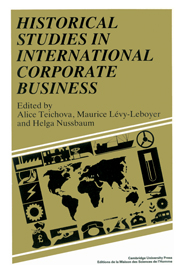Book contents
- Frontmatter
- Contents
- Preface
- 1 Introduction: multinational enterprise
- 2 History, the social sciences and economic ‘theory’, with special reference to multinational enterprise
- 3 The changing form of multinational enterprise expansion in the twentieth century
- 4 Electrical research, standardisation and the beginnings of the corporate economy
- 5 The nature of multinationals, 1870–1939
- 6 International price maintenance: control of commodity trade in the 1920s
- 7 Financial operations of US transnational corporations: development after the Second World War and recent tendencies
- 8 Multinational enterprise – financing, trade, diplomacy: the Swedish case
- 9 Foreign penetration of German enterprises after the First World War: the problem of Überfremdung
- 10 International industrial cartels, the state and politics: Great Britain between the wars
- 11 Vickers and Schneider: a comparison of new British and French multinational strategies 1916–26
- 12 J. & P. Coats Ltd in Poland
- 13 Multinationals and the French electrical industry, 1889–1940
- 14 The Japanese cotton spinners' direct investments into China before the Second World War
- 15 Mitsui Bussan during the 1920s
- 16 Japanese business in the United States before the Second World War: the case of Mitsui and Mitsubishi
- 17 The state and private enterprise in the United States–Latin American oil policy
- 18 Transnational corporations and the denationalization of the Latin American cigarette industry
- 19 Summary: Reflections on the papers and the debate on multinational enterprise: international finance, markets and governments in the twentieth century
- Index of names
- Index of firms
- Index of subjects
9 - Foreign penetration of German enterprises after the First World War: the problem of Überfremdung
Published online by Cambridge University Press: 04 August 2010
- Frontmatter
- Contents
- Preface
- 1 Introduction: multinational enterprise
- 2 History, the social sciences and economic ‘theory’, with special reference to multinational enterprise
- 3 The changing form of multinational enterprise expansion in the twentieth century
- 4 Electrical research, standardisation and the beginnings of the corporate economy
- 5 The nature of multinationals, 1870–1939
- 6 International price maintenance: control of commodity trade in the 1920s
- 7 Financial operations of US transnational corporations: development after the Second World War and recent tendencies
- 8 Multinational enterprise – financing, trade, diplomacy: the Swedish case
- 9 Foreign penetration of German enterprises after the First World War: the problem of Überfremdung
- 10 International industrial cartels, the state and politics: Great Britain between the wars
- 11 Vickers and Schneider: a comparison of new British and French multinational strategies 1916–26
- 12 J. & P. Coats Ltd in Poland
- 13 Multinationals and the French electrical industry, 1889–1940
- 14 The Japanese cotton spinners' direct investments into China before the Second World War
- 15 Mitsui Bussan during the 1920s
- 16 Japanese business in the United States before the Second World War: the case of Mitsui and Mitsubishi
- 17 The state and private enterprise in the United States–Latin American oil policy
- 18 Transnational corporations and the denationalization of the Latin American cigarette industry
- 19 Summary: Reflections on the papers and the debate on multinational enterprise: international finance, markets and governments in the twentieth century
- Index of names
- Index of firms
- Index of subjects
Summary
On 23 May 1919, the German Minister of Economics Rudolf Wissell presided over a very confidential meeting with sixty or seventy of Germany's leading industrialists to discuss ways and means of dissuading the Allied powers at Versailles from carrying out their intentions in the Saar and Upper Silesia. The chief proposal under consideration was that Germany offer the Allies economic inducements in the form of participation in German enterprises. Wissell pointed out that, ‘however painful it might be for the individual branches of industry to have strangers in their own house, where they had previously ruled alone, the distress of the Fatherland requires a renunciation of individual interest. Reich Treasury Minister Gothein presented the issues more hopefully, reminding his listeners that foreign capital had played an important role in Germany's industrialisation until favourable conditions had enabled Germany gradually to free herself from it. Germany was once again in need of capital, but her military defeat made it impossible to borrow without offering direct foreign participation in the ownership of German industrial enterprises in return. American business circles had sent out feelers along these lines. The German government, therefore, entertained the hope that a means had been found both to deflect Germany's former enemies from some of their territorial ambitions and to procure the capital needed for reconstruction.
- Type
- Chapter
- Information
- Historical Studies in International Corporate Business , pp. 87 - 110Publisher: Cambridge University PressPrint publication year: 1989
- 7
- Cited by



